As listeners tune out #resistance NPR, it’s probably a bad idea to spew platitudes while comically demonstrating the ethics of a Pravda reporter. This email exchange with WEKU’s Tom Martin is a more specific companion piece to the one I wrote on the emerging new ethics of Kentucky journalism.
***
In April, longtime NPR senior business editor Uri Berliner composed a piece for the SubStack publication The Free Press titled, “I’ve Been at NPR for 25 Years. Here’s How We Lost America’s Trust.”
Berliner’s two-part thesis goes like this: (1) NPR’s notable transition into anti-Trump “advocacy journalism” has directly contributed to a number of significant news flubs and the dogged pursuit of more than a few ridiculous story lines. (2) This shift has damaged viewer trust in the news organization and had a metastasizing effect on NPR’s (declining) audience. Increasingly, its listeners reflect and receive a narrow ideological viewpoint that undermines the very foundations of the outlet’s former standards of journalism.
All this “wouldn’t be a problem for an openly polemical news outlet serving a niche audience,” Berliner concludes of NPR’s post-Trump leap into #wokeresistance reporting. “But for NPR, which purports to consider all things, it’s devastating both for its journalism and its business model.”
The Berliner story will play a small but important part in my account below of a truly strange interaction with Tom Martin, host of the weekly hour-long radio show Eastern Standard that runs on NPR member station WEKU. Whether as MacGuffin, foreshadowing, irony or comic prop, you can decide.
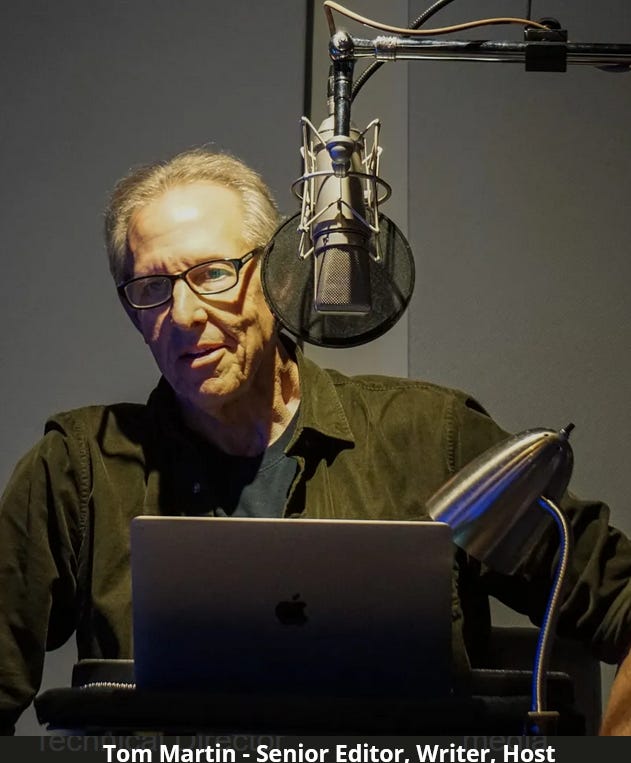
Is Uri Berliner but a MacGuffin stage prop in author’s strange digitized tale with Tom Martin, host of WEKU’s Eastern Standard? Source image.
***
Mayer to Martin
Three weeks ago, I contacted Tom Martin for a story on media ethics in the bluegrass area. I asked a pretty softball question and Martin provided a quick and direct reply. I wrote:
Hi Tom Martin,
I write for North of Center, a small outlet publishing from Lexington, KY, since 2009. I am working on a piece that involves a question of journalism ethics and hoped you could comment as the head of WEKU’s Eastern Standard.
(1) Is Eastern Standard allowed to take any government contracts for work performed for the entities it covers? In other words, can Eastern Standard take a state contract from lawmakers in Frankfort, or from elected officials in Whitesburg?
(1b) If so, why? If not, why not? (I’m looking for the ethical or other guidelines that would inform your decision.)
(2) Are you aware of any examples where media outlets have received government contracts to audit or otherwise work directly for a local, state or federal government?
Thanks for your response,
Danny Mayer
Martin responded,
- Easy answer to #1: of course not. We’re public radio and as a member station, adhere to the Standards & Practices of NPR, as well as the Code of Ethics of the Society of Professional Journalism (click here for our series on the subject.)
- An equally easy response to #1b: because to do so would certainly violate those Standards and the Code and, in any case, is just plain wrong and would create a conflict of interest in violation of the trust of our listeners, whom we respect.
- #2: No
So, a question for you: what prompts this inquiry?
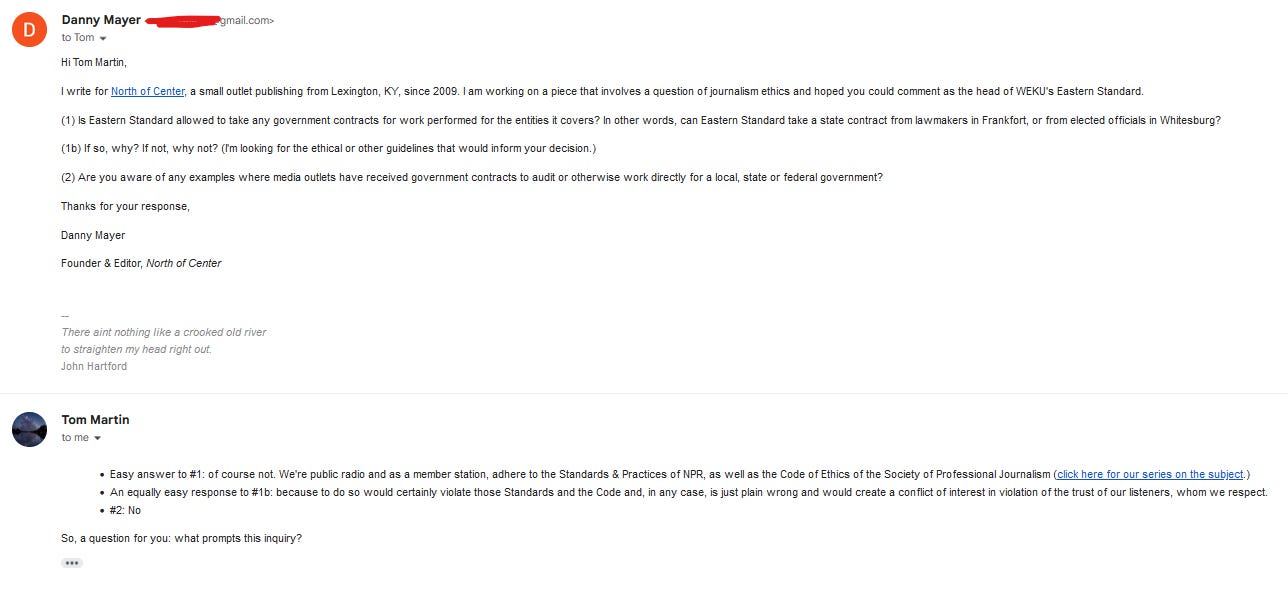
I thanked Martin for his comments and linked him to the initial CivicLex story I had written on the subject. Martin responded,
Certainly troubling. I was aware that CivicLex has placed a reporter at city hall but was under the impression the position was paid out of a grant (which was not received from LFUCG).
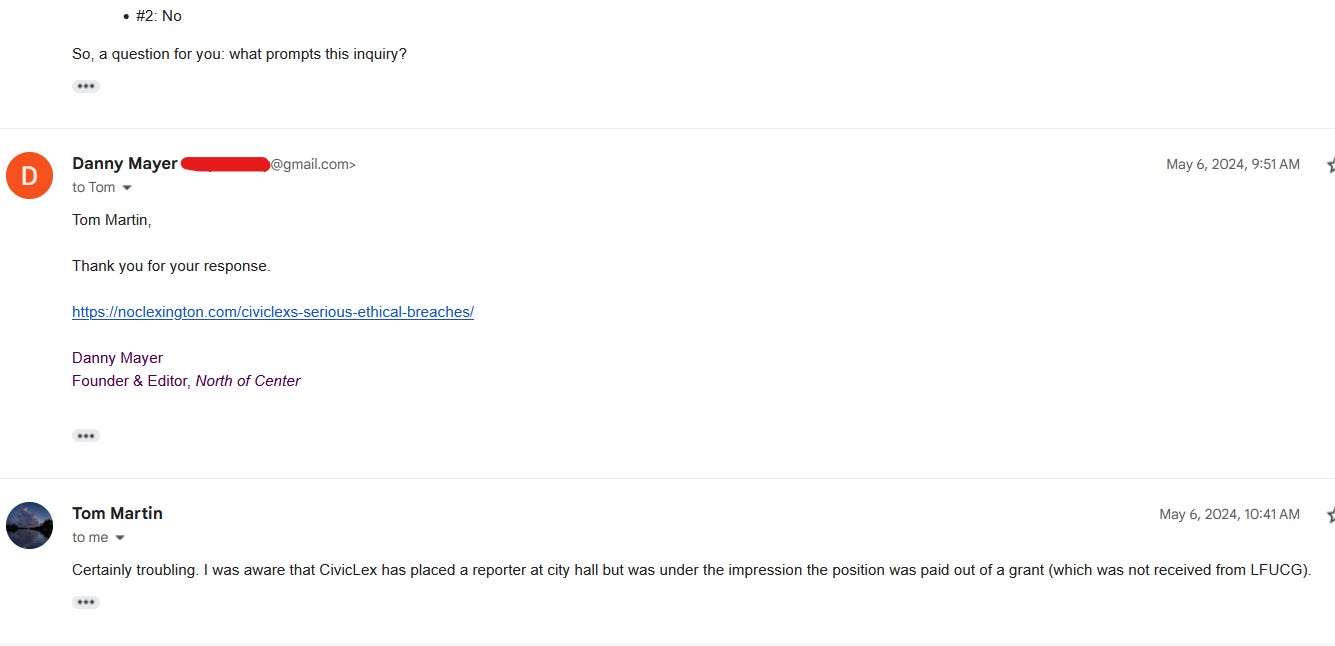
Now, if the Eastern Standard chief had stopped there, this story would not exist.
The direct, bullet-pointed response he had given me would have appeared in my original story, as it does now, as one among several professional journalists who in one form or another have an easy time stating that media outlets do not take contracts for government work.
***
Tom to Danny
But then. Twenty minutes later. Another email. This one a change in tone.
Danny—the CivicLex arrangement was good, Martin argued, which I’d have known if I had contacted CivicLex CEO Richard Young. The CivicLex reporting came from a separate grant-funding stream. There was a “strict ‘firewall’” between its city contract work and its city reporting work.
Danny – Have you interviewed Richard Young? The CivicLex city hall reporter is paid by a grant from the Mury Foundation. The contract with LFUCG would fund a completely separate project with a strict “firewall” erected between their city hall news coverage and their evaluations of boards and commissions.
Martin’s email continued.
(1) The CivicLex arrangement is good because it “is analogous to similar impervious barriers between ‘editorial/opinion’ and ‘news’.”
(2) I, Tom Martin, challenge you to find examples where NPR has been accused of being influenced by these similar analogous governmental impervious barriers!
[1] The arrangement is analogous to similar impervious barriers between “editorial/opinion” and “news” at major journalism outlets. Such existed at the three national/international news networks I’ve worked with. [2] You could just as easily go after NPR which receives taxpayer dollars from the Corporation for Public Broadcasting. But I challenge you to find an example of NPR reporting that is influenced in any way by that arrangement. [Numbers mine]
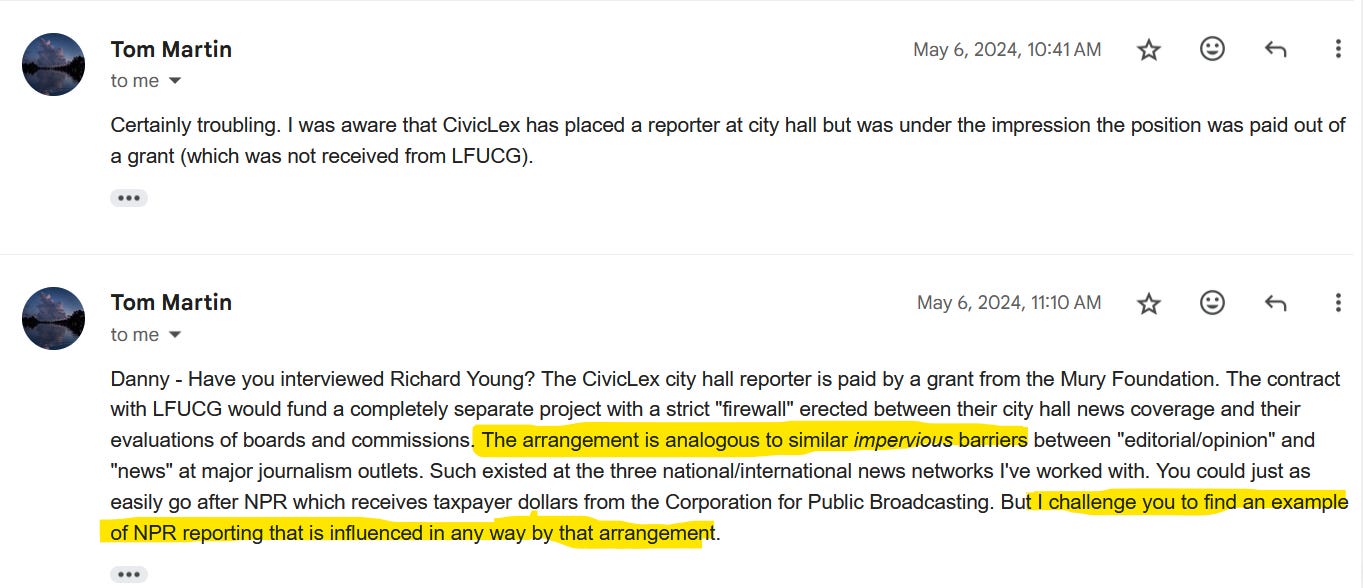
Now, reader, several bells went off for me here.
First, as somebody working to get content for a story, I needed to figure out what to do with Martin’s new statements. The new view—CivicTown is ethically all good because of analogous similar firewalls to NPR that are unchallengeable—represented a complete flip from Martin’s initial on-the-record comments that “to do so…is just plain wrong and would create a conflict of interest in violation of the trust of our listeners, whom we respect” (emphasis mine).
Added to this, the Eastern Standard chief appears to have revised his original comments after contacting Young or some other CivicLex representative in an off-the-record capacity. This also presented a challenge to your hero reporter.
And finally—and most important to me at the time—Martin’s comments made absolutely no sense. The sudden dependence upon an “analogous” NPR relationship of impervious firewalls seemed to permit a lot of wiggle room. This is exactly why ethics systems are put in place. They restrict wiggle room for friends.
***
Danny to Tom
My follow-up email addressed these reportorial concerns immediately.
I wrote:
Tom Martin,
Let me know if you want me to include the comments from your last email. If so, can you explain “analogous”? The term seems to assume a violation of journalist ethics of independence.
In his flip-flop email, Martin raised the example of federal subsidies that are paid out to NPR for its work reporting and editorializing the news. Martin then compared these NPR subsidies to CivicLex winning city contracts to analyze city boards, overhaul citizen comment process, and manage key chunks of the city’s Master Planning documents.
Politely, I called bullshit on the comparison. And then I re-stated my original question: please provide examples to support your claims, whatever they are.
NPR does not do contract work for the government that I am aware of. As I understand it, NPR gets paid government money to do news (whether that be “reporting” or “editorial work”.)…NPR does not compose reports for government; it does not oversee overhauls to citizen comments to public officials; it does not have its owners manage information on city Task Forces…
Can you provide me examples of when NPR, or other news outlets, do this non-reporting/editorializing contract work for the government that you are claiming as “analogous”?
Thanks.
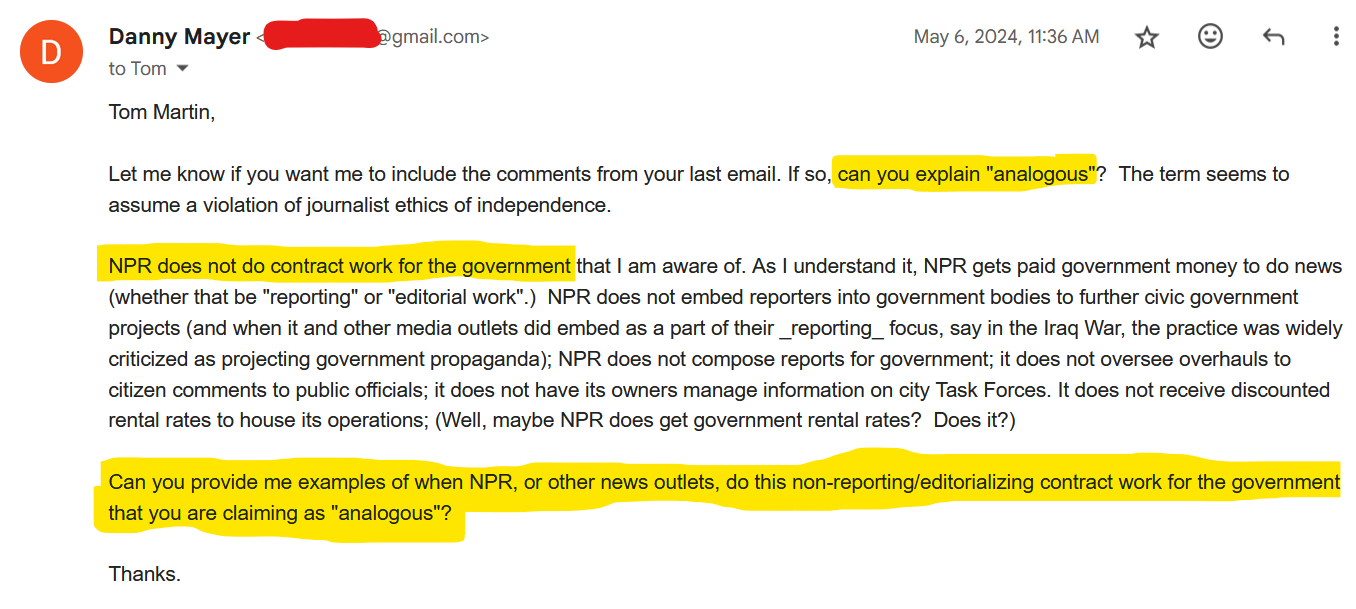
If you are wondering, Martin’s revised position is pretty flimsy. The firewall thesis is a gigantic MacGuffin. A Martin MacGuffin. An Eastern Standard MacGuffin. NPR funding and CivicLex contracts are not analogous, at least if we view both outfits as serious about their news.
Don’t take my word for it. Here is UGA professor Jay Hamilton, director of the New Media Institute in the school’s Grady College of Journalism. Without commenting on CivicLex, Hamilton characterizes Martin’s response as lacking a “full awareness of [NPR]’s institutional situation.”
“The guidelines of SPJ Code and NPR Standards and Practices are very clear,” Hamilton notes. “Even the appearance of a conflict of interest should be avoided at all costs for all professional news organizations…And, as noted, NPR has not contracted with federal agencies to do an efficiency study.”
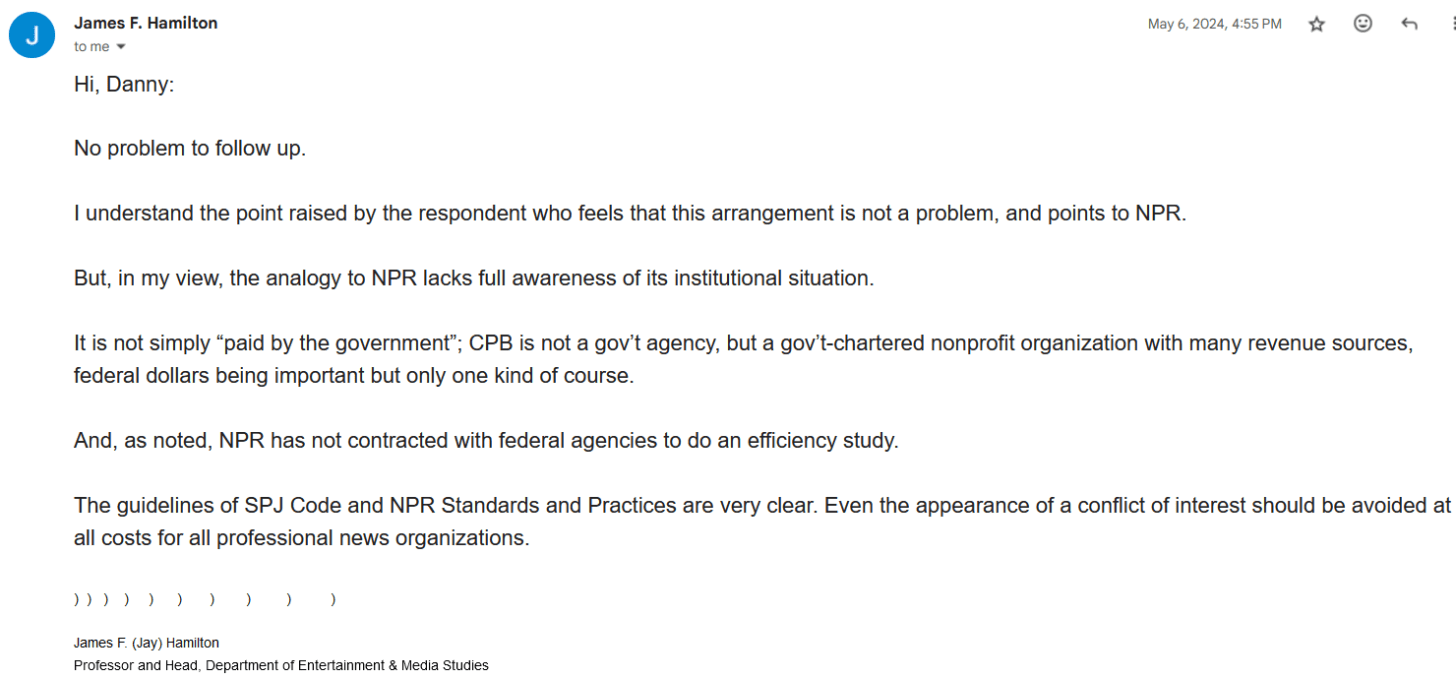
In future emails, Martin will stumble all over himself trying to defend his firewall thesis for explaining how CivicTown meets his profession’s high ethical standard for independence.
Three themes emerge.
First, Martin asserts that the CivicLex firewall is impervious and its city reporter “likely will report their findings, warts ‘n all.” Second, there is a critical need to support reporting at the local level. Third, news organizations must be trustworthy in this new post-ethics model.
Here these claims are bundled together. Note the conditionals, which are generally not associated with ethical concerns—my understanding is, likely will, may well turn out to be, I have been given no reason to:
It appears that you are conflating here, Danny. [1] My understanding is that CivicLex is not embedding a reporter into government bodies to further civic government projects. Their reporter is not involved in the evaluations of boards and commissions and likely will report their findings, warts ‘n all. [2] We are rapidly losing local beat journalists (nationwide) and the CivicLex expansion to provide a platform for city hall coverage may well turn out to be vital to sustaining daily non-partisan fact-based reporting on events at city hall. [3] This does require a level of trust in the integrity of the organization. [CONCLUSION] I have been given no reason to question that integrity. [Brackets mine.]

Martin’s conclusion, paraphrased across several emails, is: I see nothing here. I trust the CivicLex firewall. I grant CivicLex the necessary high level of trust in its organizational integrity, which is a must in this post-ethical landscape that my firewall thesis creates. Just trust me.
Though, I should also faithfully record here: across more than 5 follow-ups, Martin never once provided an “analogous” example of a serious news organization that took contract money from the same government it was covering.
That, as they say, is a tell.
***
The ironic return of the foreshadowed comic prop Uri MacGuffin
But also, here is where Berliner re-appears. For in Martin’s original flip-flop email, he also challenged me to identify an example of when NPR’s independence had been questioned.
Was Tom in a media cocoon? I swung at the softball.
(Probably off topic for this piece, but absolutely NPR has been questioned for its connection to government points of interest. The recent firing/stepping down of Uri Berliner is a well-publicized example. You may not agree with this view as an employee of NPR, but the outlet’s ethics have absolutely been questioned by a number of people in your field. And very recently.)
This would set off an alternate chain of communication that merged in weird ways with the IRL reason I had contacted Tom—which as you’ll recall was for boilerplate comment on some core professional ethics of journalism independence.
Berliner’s essay places NPR’s lost trust and viewership in the context of a sort of pedantic expert professionalism run amok. The network increasingly adhered around a few orthodox anti-MAGA viewpoints and then bent reality around them when needed. Sometimes comically so. Sometimes, as with #Russiagate, in ways that seemed to have pre-fomented a war staged in the Ukraine. Why is NPR telling me what to think? Uri apocryphally describes having listeners increasingly tell him.
Now, I’ve never spoken to Uri, I certainly shouldn’t refer to him by his first name, but Uri accurately describes the experience of this former avid listener of WEKU. After challenging me to find one single instance of NPR’s independence being questioned, and after having me cite back to him Berliner’s essay from…one whole month earlier…Tom switched from blustery challenger to exasperated teacher. Of course, you fool. Why would you think we aren’t exquisitely aware of Berliner! :
It appears that you may be under the impression that we are not exquisitely aware of the Uri Berliner matter? In fact, the internal public media ecosystem is on fire over it as many of us do agree with some (not all) of Uri’s observations – although a lot of what he has written is cherry-picked with no opportunities offered to colleagues to provide counterpoints.
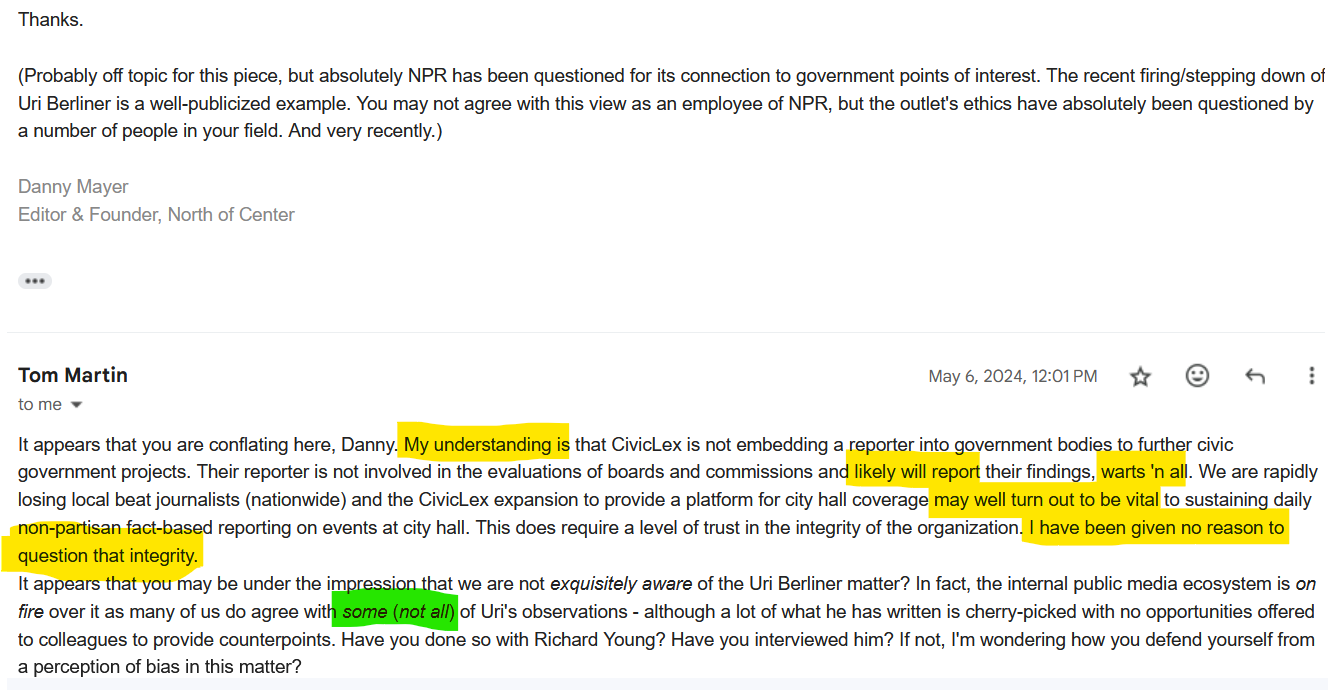
Poetically, Tom’s uritribe does a symmetrically analogous equivalence thingie with his CivicLex “firewall” thesis for journalistic independence. Tom believes in some (not all) of Uri’s observations. He won’t say which observations of course—that specific command line likely hasn’t come down to him yet. Nor does he detail how many of us NPR staffers there are who agree with some (not all) of Uri’s claims.
But Tom is certainly sure of a few things that he wants me to know. Uri had cherry-picked his observations about NPR’s media fails and political leanings. Also, by not interviewing some unidentified number of the many-of-us who believed in some (not all) of Uri’s claims, Uri was being rude to them (not all). Tom would leave unstated the historical end-point to his view, which is that Uri was pushed out of his 25-year career at NPR on the basis of these two good-manners claims that Tom will now employ to also ramen-whip me with.
There is a moral here. Do I see the moral? Here it is, from the Eastern Standard chief.
The moral to my insolence is…I am Uri. Or I might be. Tom needed to know: had I contacted the right people?
Have you done so with [CivicLex CEO] Richard Young? Have you interviewed him? If not, I’m wondering how you defend yourself from a perception of bias in this matter?
This is officially weird territory. WEKU’s host of Eastern Standard is prescribing how I should frame my story. On first glance, it’s a ballsy move, this telling me of what I ought to do.
But also supremely unprofessional. I contacted Martin for comment on whether Eastern Standard could ethically accept government contracts, and for Martin’s long-term professional observations about whether he knew of other media organizations who did or have taken money for government work. Tom used the Uri story to instead hector me about my need to interview CivicLex CEO Richard Young…or else to be prepared to “defend [myself] from a perception of bias in this matter.”
Stipulated. If Tom Martin as a journalist finds it important to interview Richard Young about his organization’s strict firewalls, or to lodge publicly an inquiry into Danny Mayer’s biased reporting against CivicLex CEO Richard Young, he is welcome to do so on his Eastern Standard radio show, broadcast weekly to untold thousands across the bluegrass and Eastern Kentucky regions. I might even listen to it.
Also stipulated, a Tom does not get to determine the focus of my reporting, nor am I obligated to define for him my own writing and research process. He is a source who gave and can continue to give quotes, so long as he decides of his own free will to respond back. I am still hopefully waiting for that to happen. But that’s all Tom is here, as he should know as someone who has done journalism for decades.
The Oh so you know about Uri; how dare you not interview Young storyline would soon overtake all communication between Tom and me. What began as an off-topic parenthetical fast assumed front-page importance.
I did attempt to get things back on track, but mainly I now had to defend myself to the Eastern Standard chief against an article that I had yet to even draft:
Tom Martin,
I assume you read my first article, which I helpfully linked for you. If not, please do and note the extensive use of sourcing to Young’s views on journalism and government collaboration. He is very well-quoted in a variety of outlets on his views about his practices. And if you read my other work, you’ll see that, as a practice, my work is well-sourced to primary news outlets. I find it bad form for you to (a) not answer the question I asked about NPR examples of government contract work; and (b) then question my own ethics.
If you can find the time and ability to answer the question, please respond back. Otherwise, your claim without evidence will be noted.
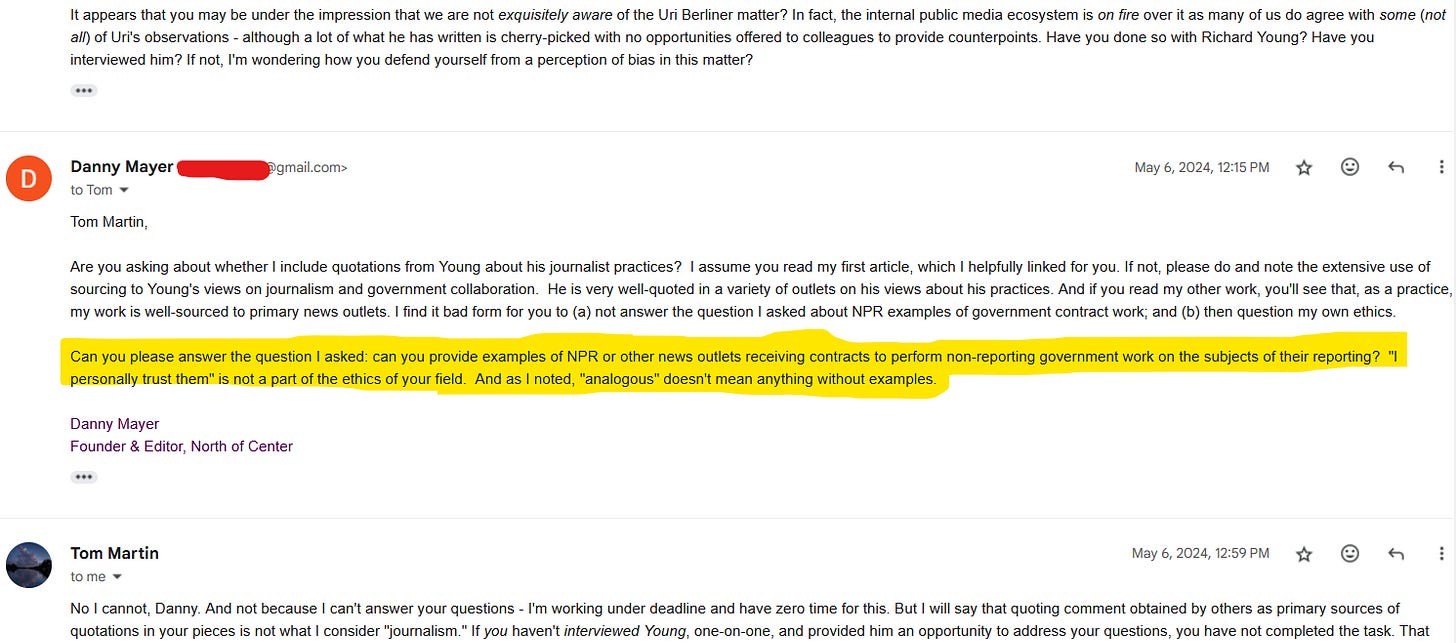
And later:
Tom Martin,
Where have I stated that I will not contact Young for this story? And where is it required that I do so? I contacted you as a source expert for an article…
If you can find the time and ability to answer the question, please respond back. Otherwise, your claim without evidence will be noted.
Tom was of course helpful.
I mean, not about the questions I had asked in my original email. Not at all. It’s not that Tom couldn’t answer them (not all). He could. It’s just that he is busy. He is working. He only has the time to pump out a few more lines on the finer details of using quotes in a proper news story, and for instructing me on the proper terms under which he would consider my task of publishing my article to be properly completed.
No I cannot, Danny. And not because I can’t answer your questions – I’m working under deadline and have zero time for this. But I will say that quoting comment obtained by others as primary sources of quotations in your pieces is not what I consider “journalism.” If you haven’t interviewed Young, one-on-one, and provided him an opportunity to address your questions, you have not completed the task.
And later, more Young doggerel (not all) expertly squeezed between the chief’s work constraints:
So you will be contacting Richard Young to schedule an interview? That’s great! I look forward to it. Please send a link.
My one-on-one email interview with Tom from Eastern Standard mostly dissipates here, in a gibberish and carping flip-flop of insider ethics dressed up as constitutionally healthy fare for consumers of local news.
***
Completing the task
To complete the task, I contacted some other Eastern Standard and WEKU-associated radio journalists.
Former Herald Leader columnist Tom Eblen was cited by Martin in his original email declaring it “just plain wrong” for media outlets to engage in government contracts. Eblen recently cohosted a 4-part Eastern Standard series on…journalism ethics. The very topic for which I had contacted Martin. (Applicable ethics episode: Part Three:Act Independently.)
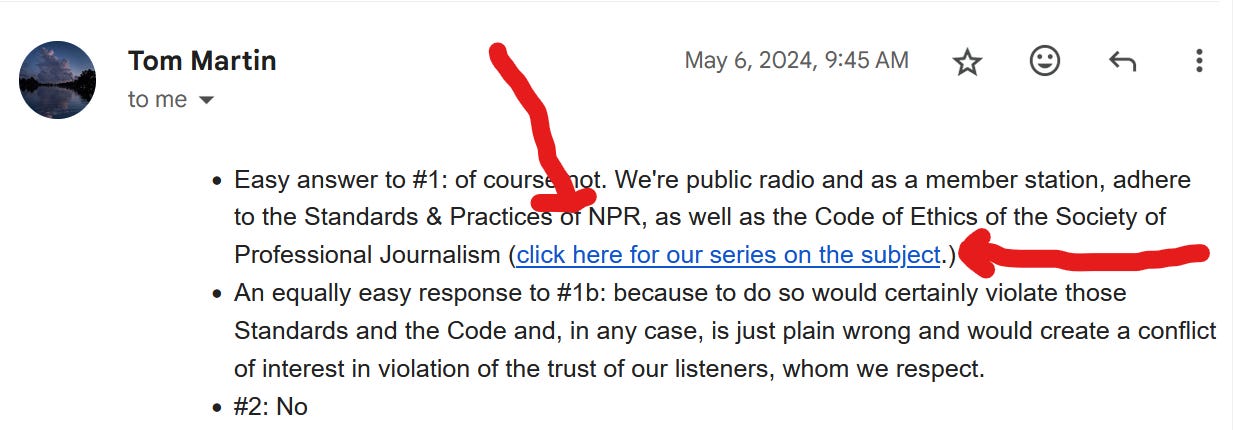
The original unambiguous Tom Martin.
I contacted Tom Eblen.

Tom declined to respond to my emails.
Eblen’s Eastern Standard co-host for the 4-part series on journalism ethics was former EKU professor Liz Hansen. (Applicable ethics episode: Part one: Seek Truth and Report It.)
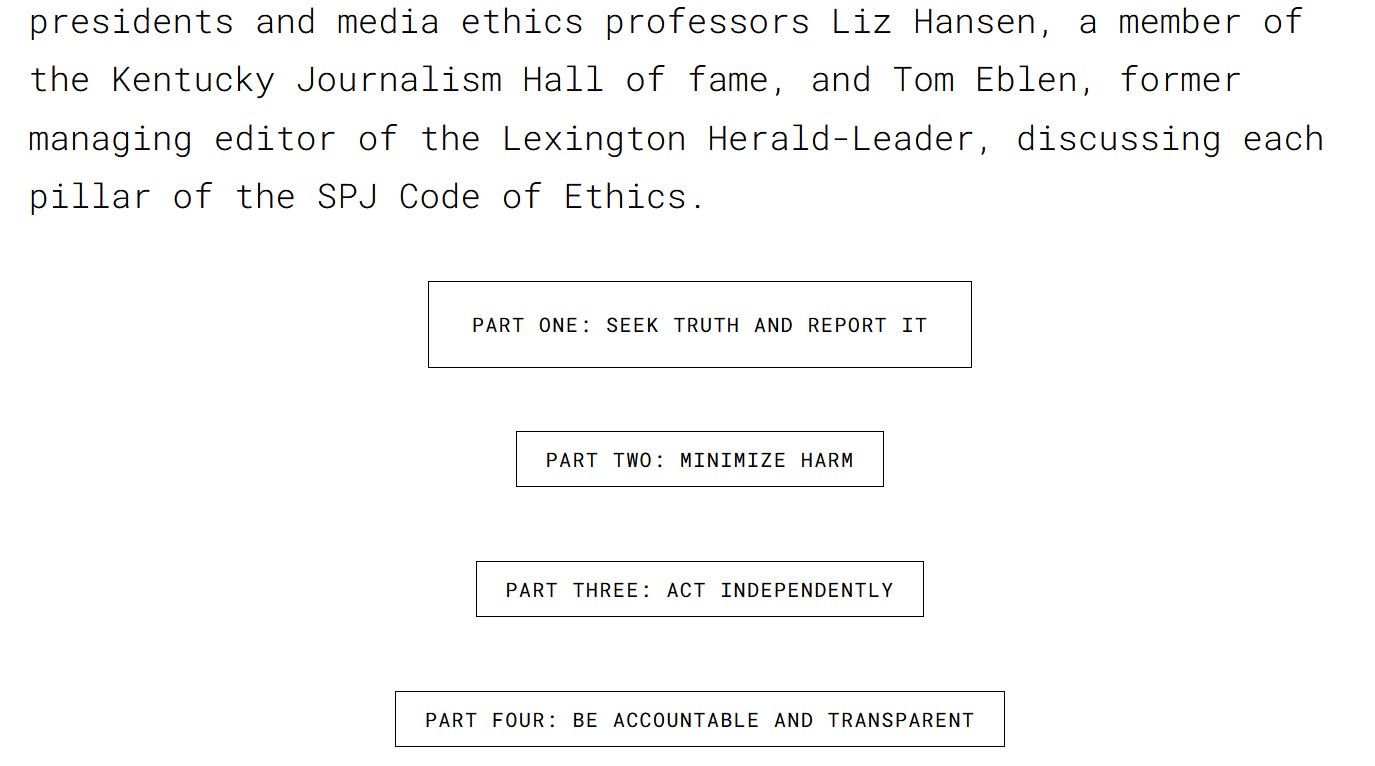
These are interesting. Take a listen.
When put in email contact through a fellow correspondent, ethics-expert Hansen declined to comment on the ethics of accepting government money for contract work.
I contacted UK Law Professor Joshua Douglas, a CivicLex Governance Board member. Douglas is also host and producer of the election year Eastern Standard series “Democracy Optimist.”
On my third attempt, Douglas graciously acknowledged my email and declined to answer anything about the ethical implications of CivicLex’s work.
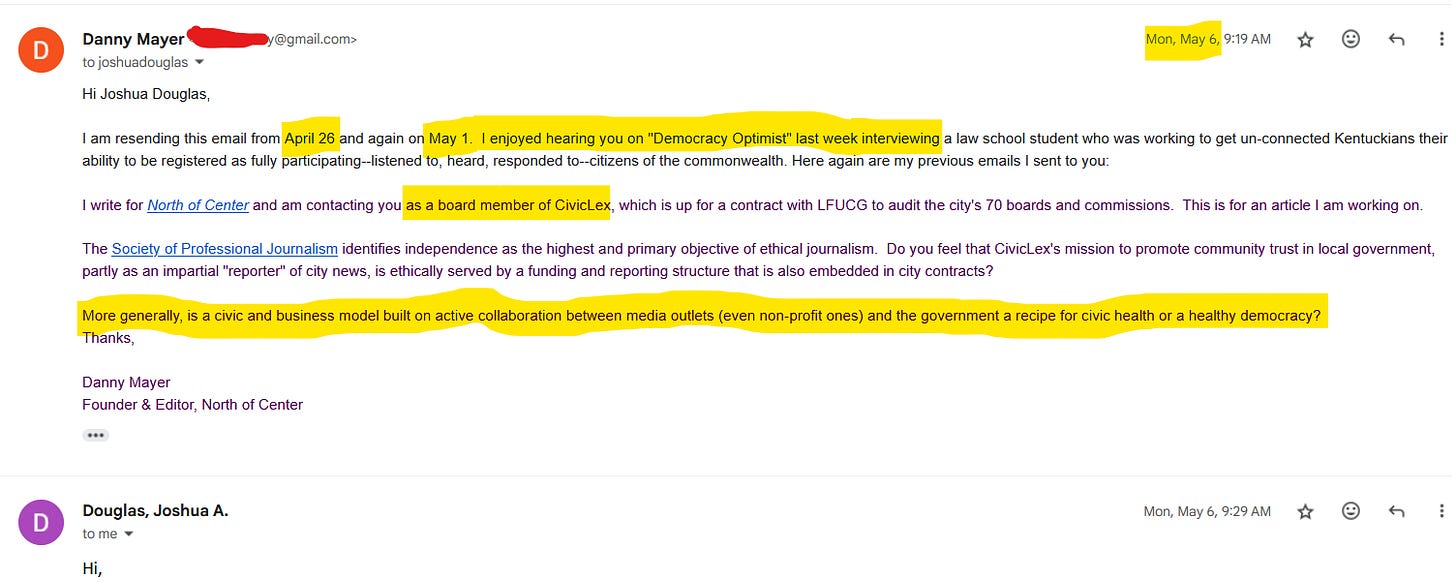
The University of Kentucky law professor, Eastern Standard contributor, and CivicLex board member claimed himself unfit to speak as an expert on journalism ethics as they relate to CivicLex.
He is, as he noted, merely a voting rights expert.
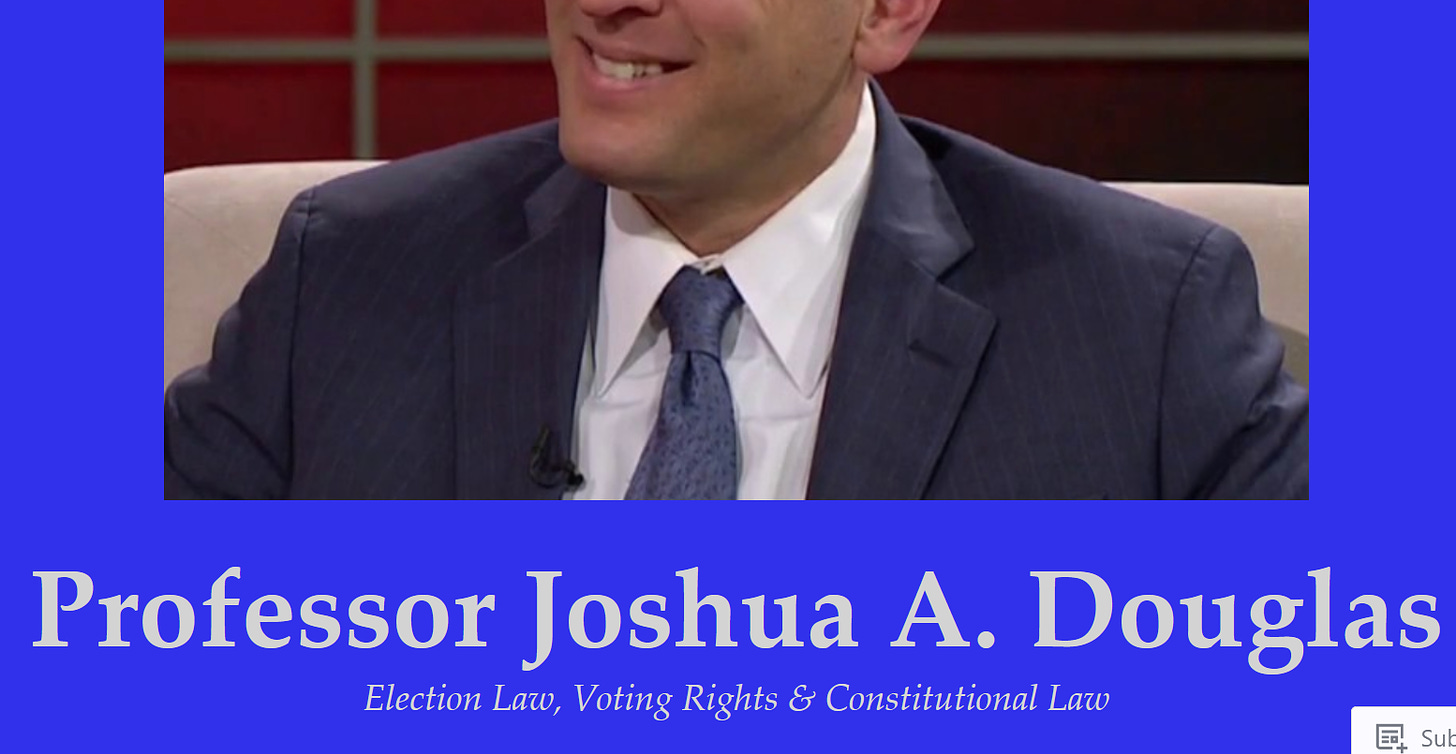
Douglas evinces a curious mismatching of expertise here. As an Eastern Standard journalist with a year-long podcast that un-subtly riffs off a Joe Biden for President campaign slogan, Douglas featured CivicLex CEO Richard Young on his third episode.
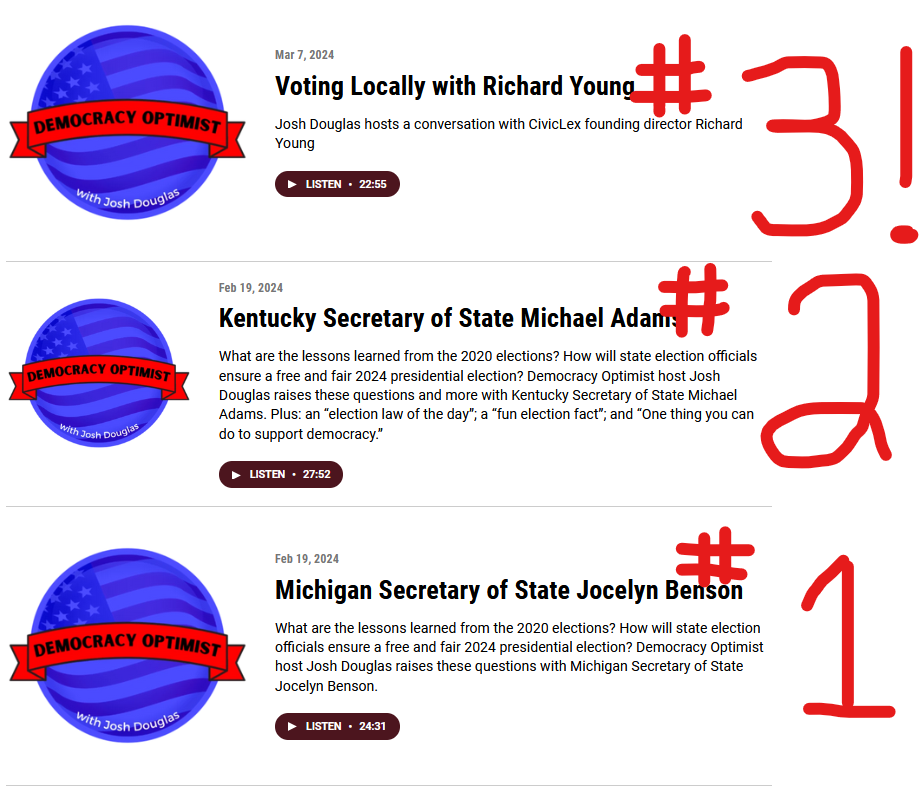
If you are ranking subjects by chronological ordering of importance regarding the academic question driving Douglas/WEKU’s “Democracy Optimist” series, which is “How do we sustain our democracy?” the show’s line of importance went Michigan Secretary of State, Guest #1; Kentucky Secretary of State Guest #2; CivicLex CEO, Guest #3.
Finally, I got in touch with Mike Savage. Mike is the dude who runs WEKU. And also, from what I gather, has a hand in Eastern Standard. I contacted the aptly named Savage after Martin had attempted to claim that his email comments to me were made off-record.
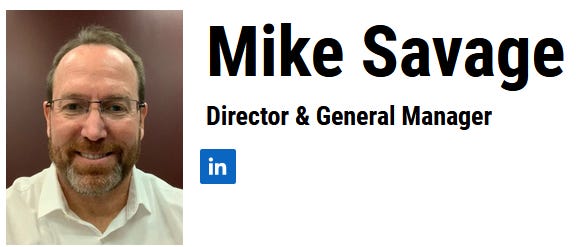
Don’t let the trimmed beard and friendly smile deceive you. Source
It was a crude move and had me contacting Martin’s superior, Savage, to assert my right to quote the Eastern Standard chief in his entirety. (I also contacted some media lawyers.) Tom was fast leveraging a bit role in my ethics article into his own starring spinoff story, and I was giving his manager a final heads up to see about changing course.
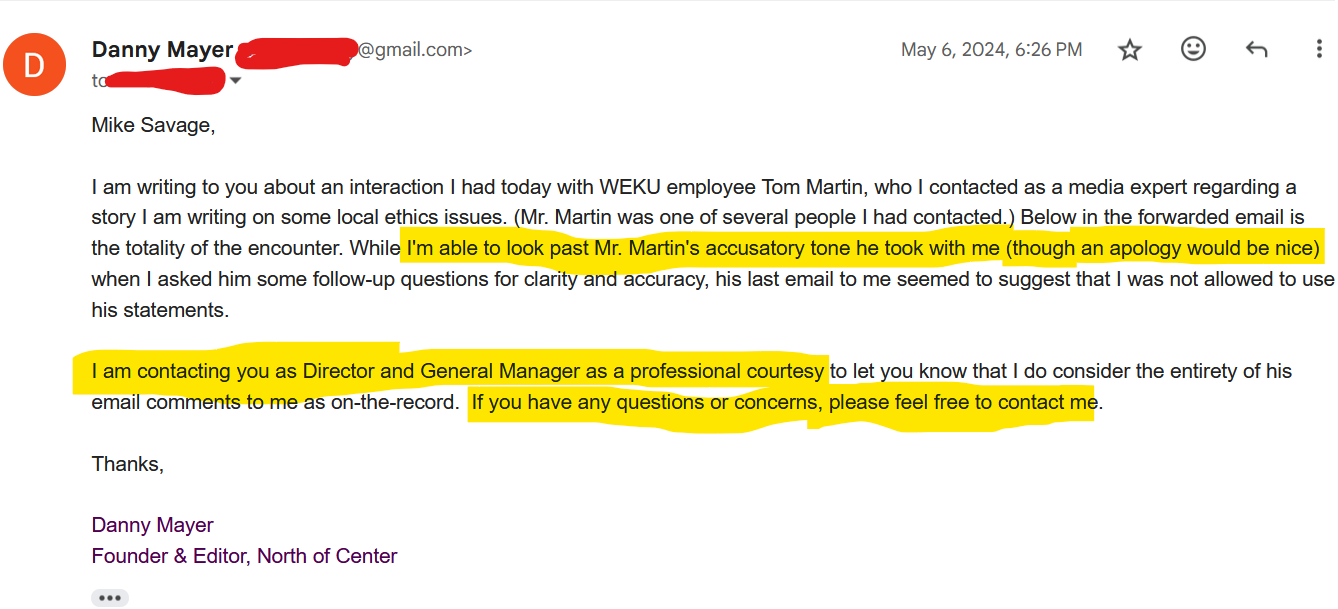
Savage doubled down and, well, set this article (and your previous 15 minutes) in motion.
The WEKU manager claimed that, like a child not allowed off his NPR journalism leash, Tom Martin was not authorized to speak. All of the Eastern Standard chief’s comments were therefore off the record and/or on background. (Humorously, Savage’s ultimatum mixed together at least two separate journalism standards for source attribution. I attempted to email him back for clarity, but he ghosted me after a “no comment.”)
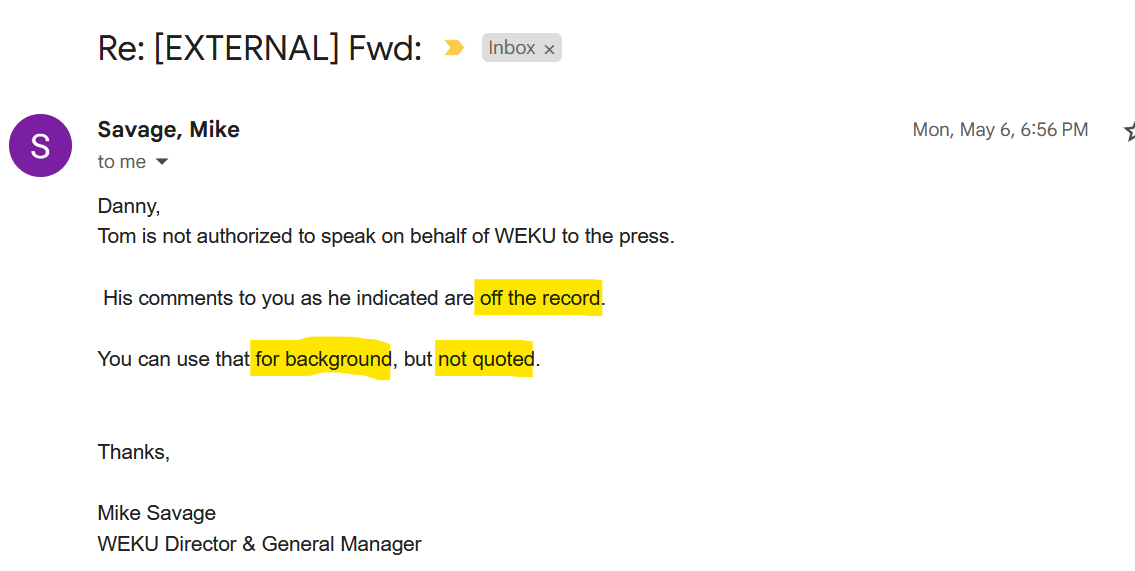
Noted: “Tom is not authorized to speak on behalf of WEKU to the press.” Mike Savage, May 6, 2024. 6:56 PM.
Dear reader. Know this. Whatever restrictions Martin, Savage and WEKU may have on Martin’s speech acts, rest easy that these are of no concern of mine.
I identified myself and asked for comment. Martin, journalist that he is, kept commenting. And I kept recording. WEKU news is not national security. I don’t need outside clearance from Chip in the Control Tower. You’d have to be a high-minded control freak to believe otherwise.

Unanswered email.
I give up.
If you can’t, as regional manager or chief content producer, get the basic facts right about what counts as on-the-record journalism. If you can’t provide an even anodyne apology to a longtime listener who valued your workers enough to contact them as source subjects.
If your “smart solutions” journalists cravenly flip flop on the basics of ethical independence. If you believe that journalism ethics lie outside of your expertise wheelhouse while simultaneously having your podcast (on “democracy,” no less) featured on a weekly journalism show.
If you just can’t be bothered to respond to questions centered on the content of your 4-part journalism ethics podcast that you self-righteously created. If you are an ostrich voice-casting as a journalist.
Well, what good are you? Can we just bring back the classical music, please?

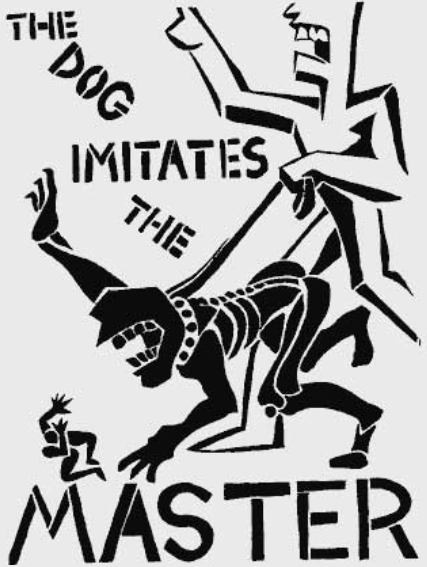

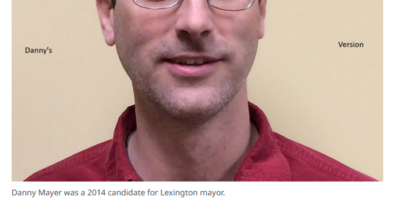
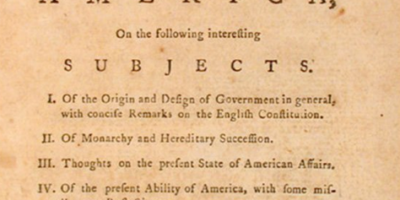
zaphod
If you hadn’t yet sought comment from CivicLex, the piece wasn’t ready for publication. If you planned to follow up in the future with them, you should have mentioned it. Martin is telling you how to write because you’re flubbing the basics.
Again, you can be right about CivicLex transgressing ethical boundaries. But you haven’t made the case that is has. Even in the excerpt you just reposted you don’t address the rebuttal Martin has made. You don’t want to take CivicLex on trust that they have the integrity to make such an arrangement work. That’s prudent. But that doesn’t mean the arrangement is necessarily unethical. You need to demonstrate why the firewall is acceptable for subscription- and donation-supported publications but not consultancy-based ones. And you have so far not indicated any interest in addressing that question.
Also, it seems like you left out whatever response you received from Joshua Douglas for this piece; did he just point you to their press contact?
zaphod
Apologies for the double-post. This should appear in the context of the thread below.
Danny Mayer
You are right; I did not make the argument that a media outlet getting paid by a government for editorials is nakedly different than the same media outlet being paid by the same government for contract work like managing public comment on the city’s development documents. That case was made pretty succinctly by UGA professor Jay Hamilton, director of the New Media Institute in the school’s Grady College of Journalism. From the article:
“The guidelines of SPJ Code and NPR Standards and Practices are very clear,” Hamilton notes. “Even the appearance of a conflict of interest should be avoided at all costs for all professional news organizations…And, as noted, NPR has not contracted with federal agencies to do an efficiency study.”
Now, can I get your credentials (and name) please so I can bounce off of Hamilton’s cred? You seem very sure that an article on the press response to CivicLex’s journalism practices require that I sit down and have a 1-on-1 interview with Richard Young, who has zero relationship to how the press respond to his work that is out there in the public realm. Further, it seems odd that you are taking an article focused on the _complete flip flop of a journalistic ethical position by a leading regional journalist, who then either flat-out lied about his being quoted or was simply ignorant on a basic journalistic practice like quoting_ and instead have attempted to place the focus on my lack of contacting CivicLex. So….who are you that this defensive posture over-rides my…uhm…actual content?
As you can see from the extensive sourcing for the above article on Tom Martin’s ethics, I have no problem contacting people for comment on topics that are relevant to the articles that I write. And if you look at my previous piece on journalism ethics in this region, I have also contacted plenty of relevant people for comment on that topic (including non-profit media outlets that you claim for some reason that I have not considered).
When I focus on the things you want me to focus on, I will contact relevant people. In the meantime, perhaps you’d prefer the safe consensus reporting that occurs elsewhere in this region, including at WEKU and CivicLex? As you noted, this outlet tends to provide original and–if I am to gather from your comments–relevant reporting that seems to skip by the other outlets.
zaphod
Okay, I understand. You are using Dr. Hamilton’s comments to assert that you think the consultancy contract is a conflict of interest, or at least has the appearance of one. I think that’s pretty reasonable. That sort of symbiotic relationship may be a net positive for the city, but it does make CivicLex more like a pure advocacy group rather than a proper media outlet. Again, they clearly think that having a firewall between the editorial and consulting staff and disclosing the consultancy is sufficient to assuage those concerns. I am not saying that this is exactly the same as the typical non-profit media arrangement, but the firewall concept is similar. So it would also be reasonable to think this arrangement is an acceptable level of independence, if the organization maintained the firewall’s integrity. That’s what Tom Martin et al were saying as well, but you seemed to think that your evaluation of the situation was so obviously correct, and his so preposterous, that you harangued him about it.
> Now, can I get your credentials (and name) please so I can bounce off of Hamilton’s cred?
As for the request to my name, my name is Zaphod Beeblebrox and I am the former Galactic President. I hope you’ll excuse my use of a pseudonym in this forum where I am not quite sure about the nature of the audience my comments will reach. I have no reporting credentials, but you know as well as I do how fallacious it is to focus on that rather than the reasoning behind what I am saying. I value Dr. Hamilton’s education and experience. But one needs formal credentials to talk about ethics as much as a fish needs a boating license.
A one-on-one interview with Mr. Young is not necessary (although it would be welcome!). But it would have been appropriate to seek–or at least indicate to your readers that you intend to seek– comment from CivicLex on how they intend to enforce their polies in practice.
Danny Mayer
An “acceptable level of independence” is not ethics. You’d know this if you were actually in or around the profession.
Did Martin or anyone else give the sort of specific evidence that you have been asking of me? Because the article is clearly not even about CivicLex…but about Tom Martin’s (1) use of his power as WEKU host to shadily make me bury quotes that he just didn’t like; (2) flip-flopping of his ethical stances based upon his personal awareness of the consultancy outlet in question; (3) complete misunderstanding of how quotations work; and (4) hilarious inability to explain what an “analogous” situation looks like…or of any media outlet that would have the balls to try to pull something off like that to its audience.
Maybe you’re right: things could be great for the community to have a consultancy non-profit manage local news w/ all the other agencies that, as you suggested earlier, all seem to hold the same mash of recycled news. But that’s not the article I wrote, though you seem to be cramming your square views into my hole of an article….with little positive evidence of your own to back anything up except “hey, why do we need a journalism expert to weigh in here…anyone can do that profession’s ethics!”
Give your actual name or you are banned from further posts on this site as they relate to CivicLex and Tom Martin.
zaphod
Danny, I’ve been reading your stuff for a few months now and dabbled some in your archive. I like your defense of the organic, genuine, un-sexy culture of the region when most publications are extremely commercial and tourism-focused. But I think the anti-establishment sentiment has led you astray this time. You have valid concerns about the arrangement between CivicLex and the city. But you were mistaken not to seek comment from CivicLex in your original piece, and you doubled down on it when confronted by the subjects in this piece. Martin called you out on that, mentioned that you should ask them directly about the auditing arrangement, and you responded by antagonizing him. And I think it’s a non-sequitur to mix this all in with the national-level discussion of the priorities of the NPR central newsroom.
As for the WEKU manager’s request to make Martin’s comments retro-actively on background; that’s obviously bogus and you were right to ignore it. If you identify yourself as a reporter and Martin chose to continue correspondence, the default assumption is on the record. Background or off-the-record comments are something your subject needs to arrange with you ahead of time. You may be interested in a recent saga of a tech blog updating their sourcing policy because of tech company PR departments abusing “background comment”: https://www.theverge.com/press-room/22772113/the-verge-on-background-policy-update
Also, please consider dropping the MS Paint-scribbled screenshots. They’re atrocious.
Danny Mayer
It is not Martin’s job to determine how I do my reporting. In part this is because the article for which I contacted him was not specifically about CivicLex, but the ethical system that has supported it. (In other words, his assumptions about my unwritten article were, as it turns out, defensively wrong.) Martin was welcome to state “no comment,” but obviously didn’t because the question I posed to him–is it ethical for a news outlet to take government contract money for things like auditing how we do citizen comments?–is so blatantly easy to answer.
If you have concerns about the original CivicLex reporting, please post your concerns on that post for better specificity of your comment and my response.
zaphod
You may indeed be right that the consulting work with the city would affect the reporting work of CivicLex. But you have failed to make a strong argument for why that is different from the subscription, donation, and grant-based models of other non-profit news outlets with firewalls between sales/fundraising and editorial. And instead of giving an intellectually honest look at that question, you presuppose the answer and do a disservice to your reader by telling them the answer is so obvious you won’t investigate.
CivicLex thinks that by being transparent about the sources, nature, and dollar amounts of consultancy work as well as an editorial firewall is sufficient to avoid the appearance off ethical misconduct. This is clearly not sufficient for you; I think I will need more information to make a judgement.
What I would like to see is an interview with Richard Young or a CivicLex spokesperson asking about the firewall policies. Are staff members prohibited from working on both consulting and reporting? What sort of communication is permissible between the staff working on these projects. Are there any restrictions on the types of work the organization will accept? Asking the Institute for Nonprofit News, of which CivicLex is a member, if such an arrangement is acceptable by their standards would also be insightful.
Danny Mayer
You are certainly welcome to your viewpoint, though I’m not sure why you are continuing the Tom presumption of telling me how to write and cover my city. Do you know that this is the last piece that I’ve written on this topic, or that I haven’t contacted people across CivicLex’s widening non-profit-sphere, even ones you cite? Further, can you cite examples of nonprofit news agencies that take contract money from the same level of government that they cover? The Alameda Post take contracts from the city of Alameda for a report to city hall on how council members can manage citizen comments?
For other readers, here is the referenced argument that questions Martin’s “firewall” thesis. It is cut/pasted from the above article:
“If you are wondering, Martin’s revised position is pretty flimsy. The firewall thesis is a gigantic MacGuffin. A Martin MacGuffin. An Eastern Standard MacGuffin. NPR funding and CivicLex contracts are not analogous, at least if we view both outfits as serious about their news.
Don’t take my word for it. Here is UGA professor Jay Hamilton, director of the New Media Institute in the school’s Grady College of Journalism. Without commenting on CivicLex, Hamilton characterizes Martin’s response as lacking a “full awareness of [NPR]’s institutional situation.”
“The guidelines of SPJ Code and NPR Standards and Practices are very clear,” Hamilton notes. “Even the appearance of a conflict of interest should be avoided at all costs for all professional news organizations…And, as noted, NPR has not contracted with federal agencies to do an efficiency study.”
In future emails, Martin will stumble all over himself trying to defend his firewall thesis for explaining how CivicTown meets his profession’s high ethical standard for independence.
Three themes emerge.
First, Martin asserts that the CivicLex firewall is impervious and its city reporter “likely will report their findings, warts ‘n all.” Second, there is a critical need to support reporting at the local level. Third, news organizations must be trustworthy in this new post-ethics model.
Here these claims are bundled together. Note the conditionals, which are generally not associated with ethical concerns—my understanding is, likely will, may well turn out to be, I have been given no reason to:
‘It appears that you are conflating here, Danny. [1] My understanding is that CivicLex is not embedding a reporter into government bodies to further civic government projects. Their reporter is not involved in the evaluations of boards and commissions and likely will report their findings, warts ‘n all. [2] We are rapidly losing local beat journalists (nationwide) and the CivicLex expansion to provide a platform for city hall coverage may well turn out to be vital to sustaining daily non-partisan fact-based reporting on events at city hall. [3] This does require a level of trust in the integrity of the organization. [CONCLUSION] I have been given no reason to question that integrity.’ [Brackets mine.]
Martin’s conclusion, paraphrased across several emails, is: I see nothing here. I trust the CivicLex firewall. I grant CivicLex the necessary high level of trust in its organizational integrity, which is a must in this post-ethical landscape that my firewall thesis creates. Just trust me.
Though, I should also faithfully record here: across more than 5 follow-ups, Martin never once provided an “analogous” example of a serious news organization that took contract money from the same government it was covering.
That, as they say, is a tell.”
zaphod
If you hadn’t yet sought comment from CivicLex, the piece wasn’t ready for publication. If you planned to follow up in the future with them, you should have mentioned it. Martin is telling you how to write because you’re flubbing the basics.
Again, you can be right about CivicLex transgressing ethical boundaries. But you haven’t made the case that is has. Even in the excerpt you just reposted you don’t address the rebuttal Martin has made. You don’t want to take CivicLex on trust that they have the integrity to make such an arrangement work. That’s prudent. But that doesn’t mean the arrangement is necessarily unethical. You need to demonstrate why the firewall is acceptable for subscription- and donation-supported publications but not consultancy-based ones. And you have so far not indicated any interest in addressing that question.
Also, it seems like you left out whatever response you received from Joshua Douglas for this piece; did he just point you to their press contact?